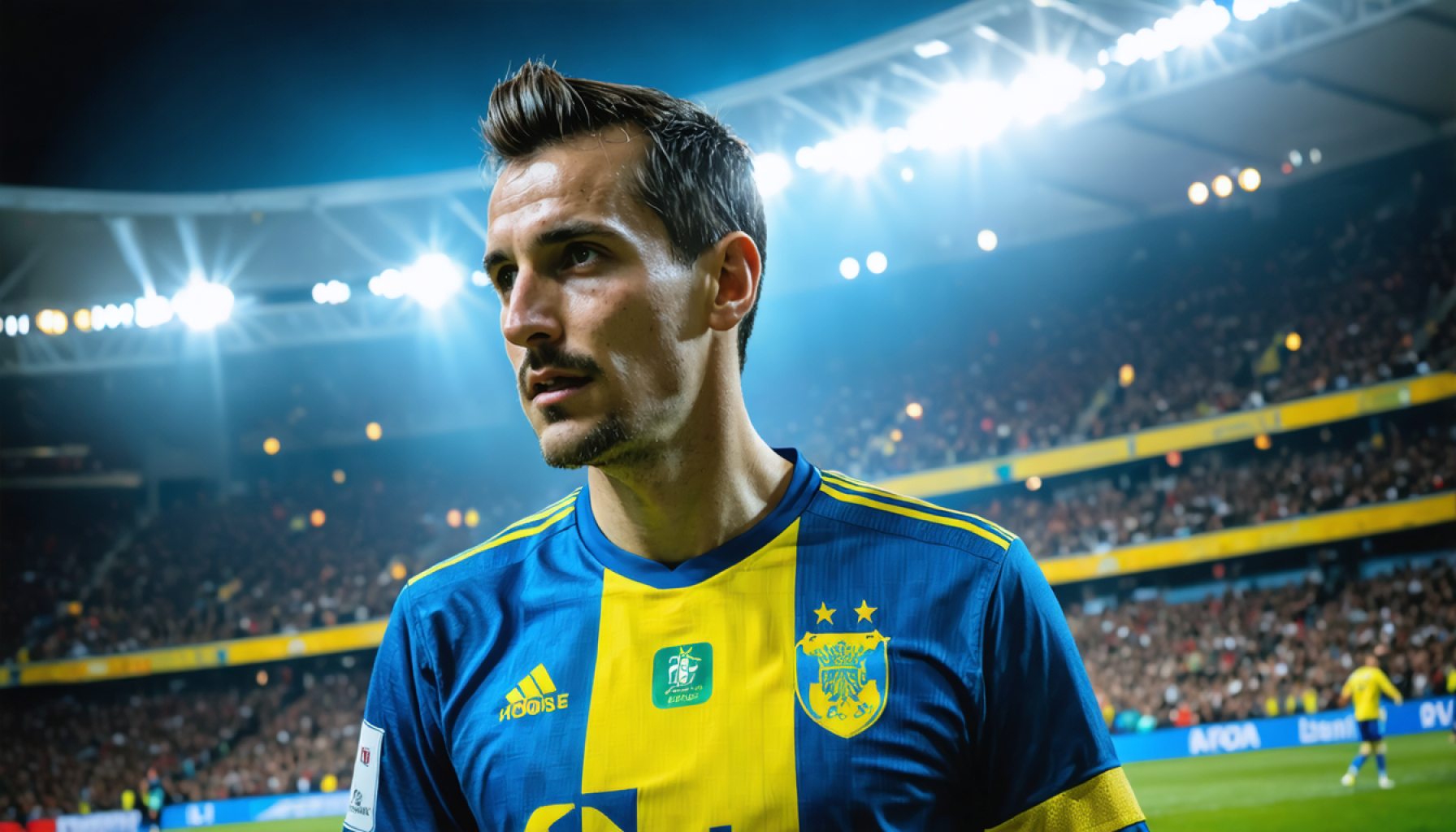- Miroslav Klose is considered a transformative figure for Ukrainian football amid recent challenges.
- Ukraine’s national team faces criticism under current coach Serhiy Rebrov for inconsistent performances.
- Klose’s extensive experience as a player and coach positions him as a potential catalyst for revitalizing the team.
- His past roles with the German national team and Bundesliga highlight his ability to develop youth talent and top-tier teams.
- While other candidates have local expertise, Klose offers global exposure and strategic insight.
- The ambition to hire a coach with international acclaim aligns with Ukraine’s vision to integrate Western methodologies into their football strategy.
- This decision marks a bold, strategic move to ensure Ukraine’s relevance on the European football stage.
- Klose symbolizes innovation and is seen as a step forward for Ukrainian football’s future success.
Amid the fluctuating fortunes of Ukrainian football, a potentially transformative figure emerges from Germany. As the national team grapples with their recent shortcomings, even after securing a spot in Euro 2024, echoes of change are reverberating through the football community. Enter Miroslav Klose, a celebrated tactician with a knack for nurturing offensive play and a vision keenly aligned with the aspirations of Ukrainian football.
The sea of criticism confronting Ukraine’s current coach, Serhiy Rebrov, is a testament to the growing impatience among fans and analysts alike. The team’s inability to progress beyond the group stages and their inconsistent performance in the Nations League has intensified the calls for a fresh approach at the helm.
Klose, with his rich pedigree as both a player and a coach, offers an intriguing solution. Known not only for his exploits on the field but also for his astute understanding of player development, Klose represents a modern bridge between youth potential and top-tier performance. His tenure as an assistant with the German national team and experience with youth squads in the Bundesliga demonstrates his ability to craft dynamic and formidable squads.
While candidates like Ruslan Rotan possess deep-rooted knowledge and a proven track record with Ukraine’s youth teams, they lack the global exposure and strategic nous that Klose can bring. The ambition of appointing a coach with international acclaim and a forward-thinking mindset could provide just the rejuvenation Ukraine needs.
However, the prospect of foreign management comes with its complexities. Coaches like Kasper Hjulmand and Marco Rose offer similarly impressive credentials but face contractual and motivational barriers that make their candidature less feasible. Meanwhile, the success of current players in international waters underlines the potential untapped.
For Ukraine, the decision to look beyond its borders for someone like Klose is both bold and strategic. It aligns with a broader vision to integrate Western methodologies into its football fabric, ensuring relevance and competition on the European stage. As Klose’s name circulates among football circles, the decision rests on whether Ukraine is ready to embrace a transformative chapter.
In a landscape cluttered with potential but often curtailed by cautious optimism, Miroslav Klose emerges not just as a clear choice but a symbol of what Ukrainian football could achieve—a step forward in a narrative yet unwritten, promising innovation and success on new shores.
Miroslav Klose: The Potential Game-Changer for Ukrainian Football
In-Depth Look at Miroslav Klose’s Potential Impact on Ukrainian Football
In the dynamic and often unpredictable world of football, Ukraine finds itself at a crossroads. Despite qualifying for Euro 2024, the national team’s recent struggles highlight the need for a fresh perspective. The emerging possibility of Miroslav Klose taking on a leadership role has sparked conversation and optimism among fans and analysts alike.
Why Miroslav Klose?
1. International Pedigree and Experience: Klose’s background as a seasoned player and coach brings a wealth of experience to any team he joins. His role as an assistant with the German national team, combined with his coaching capers in Bundesliga youth squads, equips him to cultivate dynamic team strategies and player development.
2. Rejuvenation through New Tactics: Known for his offensive play-style, Klose can bring a modern, attack-oriented approach to Ukraine’s game, potentially transforming their performance on the international stage.
3. Player Development Focus: Klose has a knack for identifying and nurturing young talent, an area where Ukraine has shown promise but needs refinement. His approach could bridge the gap between potential and execution, crafting players ready for world-class challenges.
Limitations and Considerations
Although Klose’s appointment presents exciting possibilities, several challenges require careful consideration:
– Adapting to Ukrainian Football Culture: Integrating Western methodologies into Ukrainian football isn’t without its hurdles. There’s a learning curve that both the coach and players must navigate to ensure smooth transitions and positive outcomes.
– Language and Communication Barriers: Effective communication is essential for successful coaching. While Klose’s multilingual abilities are beneficial, ensuring cohesive team communication is a foundational requirement.
Comparisons and Alternatives
Klose isn’t the only candidate the Ukrainian Football Association may consider. Coaches like Kasper Hjulmand and Marco Rose also have impressive credentials. However, their existing contracts and potential lack of alignment with Ukraine’s ambitions might pose obstacles.
1. Kasper Hjulmand: Known for his strategic mindset and recent successes in international tournaments, Hjulmand could offer alternative tactical approaches but may not align with Ukraine’s longer-term vision.
2. Marco Rose: A strong contender with a history of success in German club football. His joining could bring a wealth of experience, but contractual issues or differing motivations might deter this possibility.
Potential Real-World Use Cases and Success Scenarios
– Enhanced Youth Development Programs: Under Klose’s guidance, Ukraine could implement robust youth training methodologies, echoing the Bundesliga’s successful model and yielding a new generation of skilled players.
– Innovative Training Regimes: Klose’s adoption of technology-driven training could advance Ukraine’s football techniques, matching modern European standards.
Insights & Predictions
– Increased Competitiveness on the European Stage: With Klose at the helm, Ukraine could see improved performances in international competitions, fostering a reputation as a formidable European team.
– Long-Term Football Strategy Revitalization: By embracing a foreign coach with a forward-thinking approach, Ukraine might set a precedent for future strategies, impacting national football dynamics positively over the coming years.
Recommendations for Ukraine
– Commit to Long-Term Goals: Prioritize sustained development initiatives over short-term gains.
– Facilitate Cultural Integration: Provide resources for seamless cultural and linguistic integration for the new leadership.
– Focus on Youth Development: Leverage Klose’s expertise to foster a robust grassroots program, ensuring a pipeline of talented players ready for global challenges.
For more updates and insights on football coaching trends, visit the official FIFA website FIFA.
By leveraging Klose’s international strategies and insights, Ukraine stands on the precipice of potentially revolutionizing its football landscape, aspiring for not just participation, but victory on the grand European stage.








